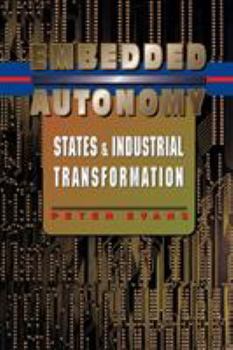Embedded Autonomy: States and Industrial Transformation
Select Format
Select Condition 
Book Overview
In recent years, debate on the state's economic role has too often devolved into diatribes against intervention. Peter Evans questions such simplistic views, offering a new vision of why state involvement works in some cases and produces disasters in others. To illustrate, he looks at how state agencies, local entrepreneurs, and transnational corporations shaped the emergence of computer industries in Brazil, India, and Korea during the seventies...
Format:Paperback
Language:English
ISBN:0691037361
ISBN13:9780691037363
Release Date:February 1995
Publisher:Princeton University Press
Length:344 Pages
Weight:1.10 lbs.
Dimensions:0.9" x 6.1" x 9.2"
Related Subjects
Asia Brazil Business Business & Finance Business & Investing Business & Management Communication Policy Computers & Technology Databases Economic Policy Economic Policy & Development Economics History Industries & Professions Korea Oracle Political Science Politics & Government Politics & Social Sciences Public Policy Reference Social Sciences South America TextbooksCustomer Reviews
3 ratings
It is worth reading
Published by Thriftbooks.com User , 18 years ago
The author analyzes how East Asian countries make their economic development successful with state autonomy and also tells the difference among those countries, which means that if other countries wants to copy the above models, they need to decide what model they could apply.
Outstanding book
Published by Thriftbooks.com User , 20 years ago
An excellent comparative study of efforts by developmental states in India, Brazil, and South Korea to break out of preordained "comparative advantage" and develop modern high-tech sectors for their respective economies. Based on extensive field research in all three countries and supplemented by thorough use of archival evidence.
The mechanism of developmental state
Published by Thriftbooks.com User , 21 years ago
This book is regarded as de facto classic in the tradition of developmental state. The strategy of developmental state is the denial of extant hierarchy of comparative advantage. To achieve high growth rate, there should be high return sectors. But such sectors, in general, have no relation with developing countries. Then, should developing countries rest with agriculture or labor-intensive industries? Not necessarily. Such sectors tend to be low value-added, in other words, with low growth prospect. If you don¡¯t have it, then make it! It¡¯s the strategy of developmental state. But it¡¯s no more than what to do. There was not satisfactory conceptualization on how East Asian developmental state put that strategy into practice. Amsden¡¯s ¡®Asia¡¯s Next Giant¡¯ (reciprocity) and Evans¡¯ this book marked some conceptual leapfrogging.In the tradition of developmental state, state intervention is pinpointed as a necessary factor to rapid industrialization in East Asian countries. This book elaborates what states did to promote the industrial transformation (or, in Porter¡¯s word, achieve competitive advantage). Evans argues that ¡®embedded autonomy¡¯ (networking between bureaucrats and business) was the key to the developmental state¡¯s effectiveness. What define the developmental state are ¡®the state autonomy¡¯ (or strong state in the jargon of political science) and ¡®the state capacity¡¯. The state autonomy refers to the insulation of the bureaucracy from particularistic interests of, for example, the labor, the landlord, civil society, or the business. But ¡® a state that was only autonomous would lack both sources of intelligence and the ability¡¯ to implement its strategy. But the state that is only embedded is ready for capture. ¡®Only when embeddedness and autonomy are joined together can a state be called developmental.¡¯ Evans takes real world example, to support his conception, from history of IT sector in South Korea. IT sectors of India and Brazil are taken together. But latters are mobilized to contrast Korea¡¯s against them.





